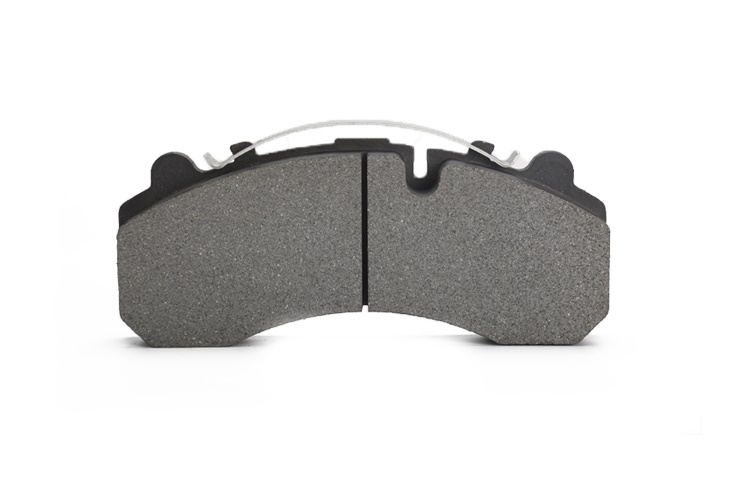Brake Pads for Heavy-Duty Vehicles

Brake Pads for Heavy-Duty Vehicles: Technical Details and Latest Technologies
Automev.Com Blog Post
Brake pads are one of the most critical components of a vehicle's braking system. They play a vital role in ensuring vehicle safety by minimizing stopping distances. In heavy-duty vehicles, the quality and performance of brake pads are essential due to their high load-carrying capacity and demanding operating conditions. This blog post will explore the technical details, material types, usage conditions, and the latest technologies in brake pads.
What Are Brake Pads and How Do They Work?
Brake pads are components that press against the brake disc or drum to convert kinetic energy into thermal energy, slowing or stopping the vehicle. The performance of brake pads depends on factors such as friction coefficient, temperature resistance, and wear durability.
In heavy-duty vehicles, brake pads must be highly durable and long-lasting. These pads are used in both disc and drum brake systems.
Material Types and Varieties of Brake Pads
The materials used in brake pads are designed to maximize friction and longevity. Here are the most common types of brake pad materials:
-
Organic Pads:
- Made from materials like glass fiber, resin, and rubber.
- Suitable for light-duty vehicles but may underperform under high temperatures.
-
Metallic Pads:
- Contain iron, copper, and steel powders.
- Offer high friction and durability, making them ideal for heavy-duty vehicles.
-
Ceramic Pads:
- Composed of ceramic fibers and fillers.
- Provide excellent performance under high temperatures and operate quietly.
-
Semi-Metallic Pads:
- A mix of metallic and organic materials.
- Balance durability and cost-effectiveness.
Advancements in Brake Pad Technologies
Modern brake pads are being developed using advanced technologies to enhance performance and reduce environmental impact. Below are some of the latest trends:
-
Asbestos-Free Materials:
- Asbestos has been phased out due to its environmental and health hazards. Modern pads are safer and more sustainable.
-
Noise-Reducing Pads:
- Special materials and designs minimize noise during braking, ensuring quieter operation.
-
Heat Management Innovations:
- Advanced materials and designs improve heat dissipation, preventing overheating during prolonged braking.
-
Pads for Electric Commercial Vehicles:
- Brake pads optimized for electric vehicles handle unique braking demands, such as higher regenerative braking forces.
Usage Conditions and Installation Tips for Brake Pads
1. Choosing the Right Pad:
- Brake pads must be compatible with the vehicle's make and model.
- Pads designed specifically for heavy-duty vehicles withstand higher loads and offer better performance.
2. Installation Guidelines:
- Clean the brake disc or drum thoroughly before installation.
- Ensure the pads are tightened to the recommended torque values.
3. Usage and Maintenance:
- Overloaded vehicles may cause pads to wear out faster. Regular inspections and maintenance are essential.
- Excessive heat can reduce pad performance, so proper ventilation of the braking system is crucial.
4. Bedding Process for New Pads:
- New pads should go through a bedding process to ensure the surface aligns properly with the brake disc or drum. This enhances their performance and lifespan.
Frequently Asked Questions About Brake Pads
1. How long do brake pads last?
- In heavy-duty vehicles, brake pads typically last between 30,000 to 100,000 km, depending on driving conditions and vehicle load.
2. Which material type is best?
- The choice depends on usage. Ceramic pads are ideal for high performance, while organic pads are more cost-effective for light-duty applications.
3. Can worn brake pads be repaired?
- No, worn pads should be replaced to ensure safety and proper braking performance.
Automev.Com: Reliable Brake Pad Solutions for Heavy-Duty Vehicles
At Automev.Com, we offer high-quality brake pads designed for heavy-duty vehicles. Our products are tailored to fit specific makes and models, ensuring durability and superior performance. Explore our wide range of spare parts on our website, including:
- Brake Pads
- Brake Discs
- Brake Drums
- Wheel Hubs
Selecting the right products and performing regular maintenance are crucial for vehicle safety. Visit our website for more information and place your order today.
Automev.Com – Trusted Brake Pad Solutions for Heavy-Duty Vehicles

 TR
TR EN
EN

